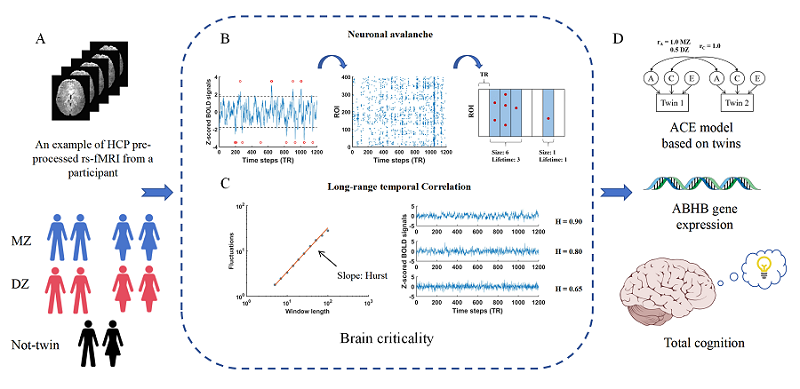A new study published on June 24 in PNAS has revealed compelling evidence that brain criticality-a dynamic balance between neural excitation and inhibition-has a strong genetic foundation and is associated with cognitive performance.
Led by Prof. LIU Ning from the Institute of Biophysics of the Chinese Academy of Sciences (CAS) and Prof. YU Shan from the Institute of Automation of CAS, researchers analyzed resting-state functional MRI (rs-fMRI) data from the Human Connectome Project S1200 release. The dataset included 250 monozygotic twins, 142 dizygotic twins, and 437 unrelated individuals, providing a robust framework for examining the heritability of critical brain dynamics.
The results showed that brain criticality is significantly influenced by genetic factors, with stronger genetic effects observed in primary sensory cortices compared to higher-order association regions. These findings suggest that the capacity of the brain to maintain near-critical dynamics-previously associated with optimal information processing and cognitive flexibility-is, to a substantial degree, inherited.
By integrating rs-fMRI data with transcriptional profiles from the Allen Human Brain Atlas, the researchers further identified gene expression patterns that explain regional criticality and are enriched in biological processes linked to brain disorders.
Crucially, the team uncovered a shared genetic basis between brain criticality and cognitive performance, offering new insights into how genetics may support optimal brain function.
"Maintaining criticality is essential for brain function," said Prof. LIU. "Uncovering its genetic basis opens new directions for understanding cognition and neurological disease."
This work lays the foundation for future research into the molecular mechanisms behind critical brain dynamics and their implications for brain health.

Schematic diagram of the heritability estimation pipeline for critical dynamics (Image by LIU Ning's group)






